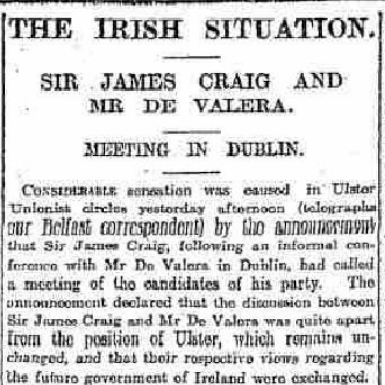James Craig and Eamon de Valera Meet in Dublin
06 May 1921

The Scotsman, 6 May 1921
On 5 May 1921, two days after the formation of Northern Ireland, James Craig and Eamon de Valera held an unlikely meeting in Dublin. It was widely reported as an unproductive encounter, during which the two leaders displayed their lack of shared history or common ground. In the following editorial The Scotsman reflected on the meeting, the relative positions of the two leaders, and possible solutions to the ‘Irish question’.
Extremes Have Met in Ireland
… The facts that Sir James Craig, the recognised leader of the Ulster Unionists, had what is called an ‘informal conference’ in Dublin yesterday with Mr De Valera, the Chief of the Sinn Féin movement, and that the former has called together a special meeting of his party to be held in Belfast to-day, are so unlooked for and so obviously significant that there will be hesitation, among all thoughtful and responsible people, in expressing an opinion as to the probable import and outcome. There is, above all, a danger of false hopes being raised, of jumping to hasty and over-sanguine conclusions. Speculation has, of course, been let loose on both sides of the Irish Channel; but late last night, as the result of an interview with Sir James Craig, several speculations were laid to rest …
… The meeting of opposites at Dublin, if hardly expected at the present juncture, has not come about wholly without warning. There have been signs, in their actions if not in their words, that the Sinn Féin leaders were drifting into a desperate position. Having accepted the aid of the weapons and agents of assassination, and thereby brought obloquy on their cause, they find it difficult to put them aside. They are believed to have lost popularity also through Cardinal Logue’s pronouncement against Republicanism. Some of them would be glad to find a way of escape from ground they feel to be impracticable and untenable …
… It is right that all possible avenues towards peace should be thoroughly explored; so that even if the way is not found the obstacles that stand in the way may be clearly seen. But those who perceive in the Dublin interview ‘the first practical step towards a permanent solution of the Irish question’ should reflect that the Irish Convention of 1916, carried on under more hopeful auspices by men whose views and positions were much nearer together than those of De Valera and Sir James Craig, ended in failure.














